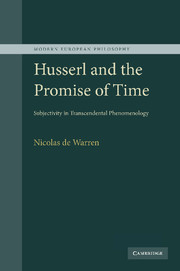Book contents
- Frontmatter
- Contents
- Acknowledgments
- List of abbreviations
- Introduction: the promise of time: subjectivity in Husserl's transcendental phenomenology
- 1 The ritual of clarification
- 2 A rehearsal of difficulties
- 3 The ghosts of Brentano
- 4 The retention of time past
- 5 The impossible puzzle
- 6 The lives of Others
- 7 The life of consciousness
- Appendix: note on textual sources
- Bibliography
- Index
2 - A rehearsal of difficulties
Published online by Cambridge University Press: 20 January 2010
- Frontmatter
- Contents
- Acknowledgments
- List of abbreviations
- Introduction: the promise of time: subjectivity in Husserl's transcendental phenomenology
- 1 The ritual of clarification
- 2 A rehearsal of difficulties
- 3 The ghosts of Brentano
- 4 The retention of time past
- 5 The impossible puzzle
- 6 The lives of Others
- 7 The life of consciousness
- Appendix: note on textual sources
- Bibliography
- Index
Summary
Problems that appear small are large problems that are not understood.
— Ramón y CajalSmall change
Of the many ways in which there is truth to Husserl's confession, “without Brentano, I would have never written one word of philosophy,” his inheritance of distinguishing between addressing questions and handling problems is especially significant. More pronounced than in Brentano, this distinction is unmistakable in Husserlian phenomenology. On the one hand, substantial questions of philosophy, gathered around the axis of how knowledge is at all possible, feature prominently throughout Husserl's writings. In the 1905 lectures “On Inner Time-Consciousness” (hereafter: ITC lectures), for example, Husserl begins with a stirring evocation of Augustine's Confessions and the question quid est enim tempus that “nearly brought Augustine to despair.” As Husserl is quick to declare, despite “our modern age, so proud in its knowledge, we may still say today with Augustine: si nemo a me quaerat, scio, si quaerenti explicare velim, nescio” (Hua X, 3 [3]). In one broad stroke, the sweep of such a question opens a space for reflection; the question of time is decisively raised anew. On the other hand, Husserl attacks philosophical questions by handling specific problems that do not seem proportionate to the burden of the general questions they are meant to shoulder. Under the heading of the question of time, the investigations developed in the ITC lectures as well as in subsequent research manuscripts pursue a circumscribed set of issues, most importantly, the perception of temporal succession and the temporality of consciousness.
- Type
- Chapter
- Information
- Husserl and the Promise of TimeSubjectivity in Transcendental Phenomenology, pp. 50 - 96Publisher: Cambridge University PressPrint publication year: 2009

